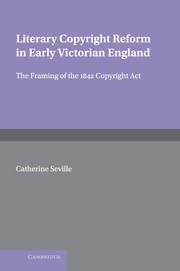Book contents
- Frontmatter
- Contents
- Acknowledgements
- 1 INTRODUCTION
- 2 PETITIONS AND COPYRIGHT
- 3 CRITICS IN PARLIAMENT
- 4 CRITICS IN THE BOOK TRADE I: PRINT WORKERS AND THEIR ALLIES
- 5 CRITICS IN THE BOOK TRADE II: PUBLISHING AND PUBLISHERS
- 6 THE CAMPAIGN IN THE DAILY PRESS
- 7 AUTHORS AND THE BEGINNINGS OF AUTHORS' ORGANISATIONS
- 8 THE MAKING OF THE CASE FOR THE BILL
- 9 CONCLUSION
- Appendix I Chronology of the bills
- Appendix II Successive versions of the bill
- Appendix III The Copyright Act 1842
- Bibliography
- Index
8 - THE MAKING OF THE CASE FOR THE BILL
Published online by Cambridge University Press: 18 July 2009
- Frontmatter
- Contents
- Acknowledgements
- 1 INTRODUCTION
- 2 PETITIONS AND COPYRIGHT
- 3 CRITICS IN PARLIAMENT
- 4 CRITICS IN THE BOOK TRADE I: PRINT WORKERS AND THEIR ALLIES
- 5 CRITICS IN THE BOOK TRADE II: PUBLISHING AND PUBLISHERS
- 6 THE CAMPAIGN IN THE DAILY PRESS
- 7 AUTHORS AND THE BEGINNINGS OF AUTHORS' ORGANISATIONS
- 8 THE MAKING OF THE CASE FOR THE BILL
- 9 CONCLUSION
- Appendix I Chronology of the bills
- Appendix II Successive versions of the bill
- Appendix III The Copyright Act 1842
- Bibliography
- Index
Summary
PETITIONS – THOSE IN FAVOUR
Wordsworth's involvement provides a fascinating narrative of the bill's progress: the campaigning played a major part in the bill's eventual success. The petitions themselves are particularly worth studying for what they reveal about the ability of the literary world to unite – contrary to all previous history.
Petitioning was a sensitive matter. There had been adverse comment in parliament about the lack of support from authors, who were supposedly the main beneficiaries of the changes. By 1838 only one petition had been received in favour of the copyright bill. This came from Samuel Wells, ‘Barrister at Law and Register of the Honourable the Corporation of the Great Level of the Fens, called the Bedford Level’. Samuel Wells described himself as the author of ‘a laborious work called the History of the Bedford Level’, a book ‘of slow sale and limited circulation’. He was working on another book, ‘The History of the Revenue and Expenditure of the United Kingdom’, which had already entailed great expense in preparation. His argument was that important works of this nature should be encouraged: ‘no property is more legitimate, or more worthy of protection, than the works of authors who spend so many laborious days and sleepless nights in administering to the delight and the instruction of mankind at large’.
Talfourd was probably all too aware of the impression that this was likely to make, and began a campaign to persuade people to petition.
- Type
- Chapter
- Information
- Literary Copyright Reform in Early Victorian EnglandThe Framing of the 1842 Copyright Act, pp. 176 - 209Publisher: Cambridge University PressPrint publication year: 1999



